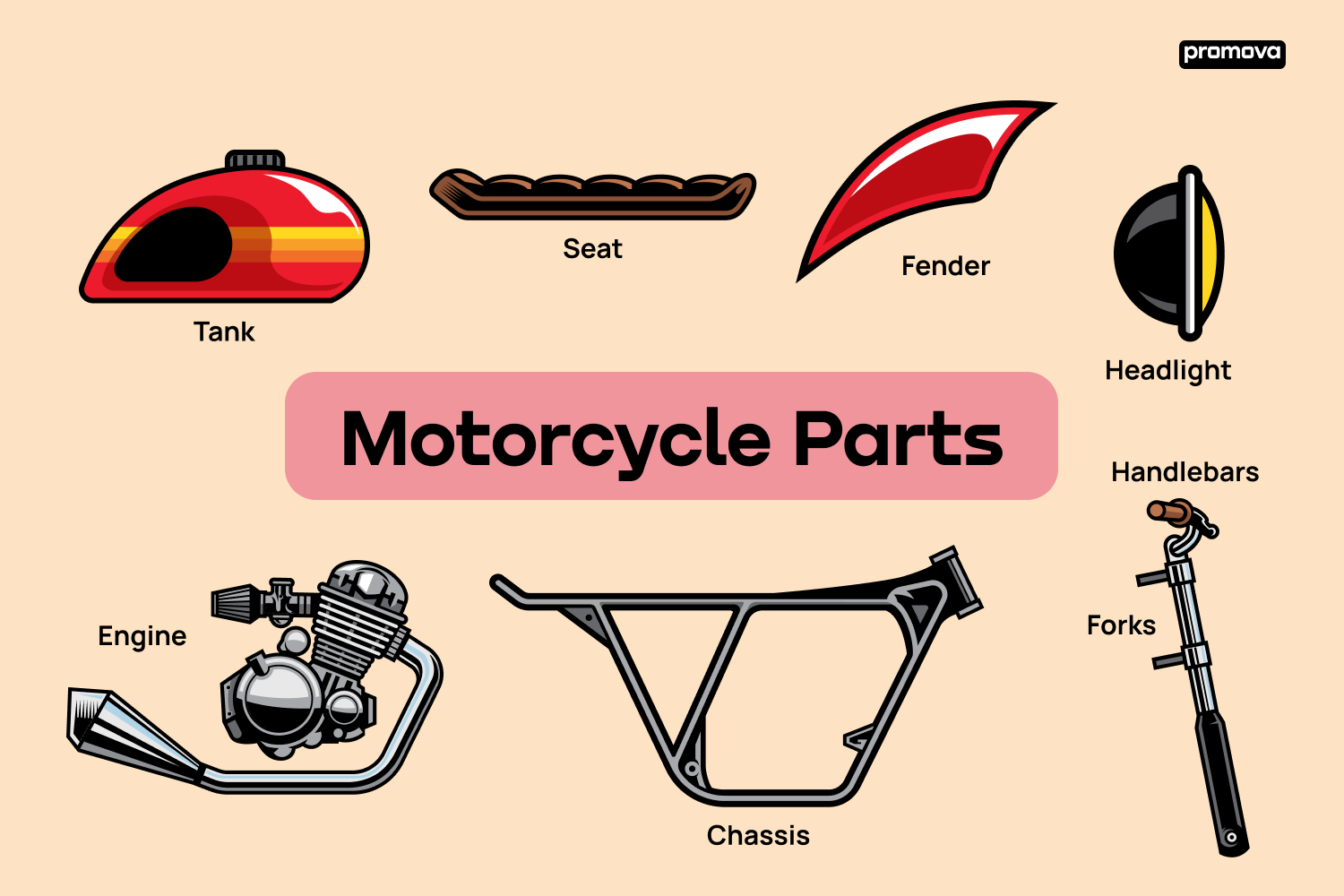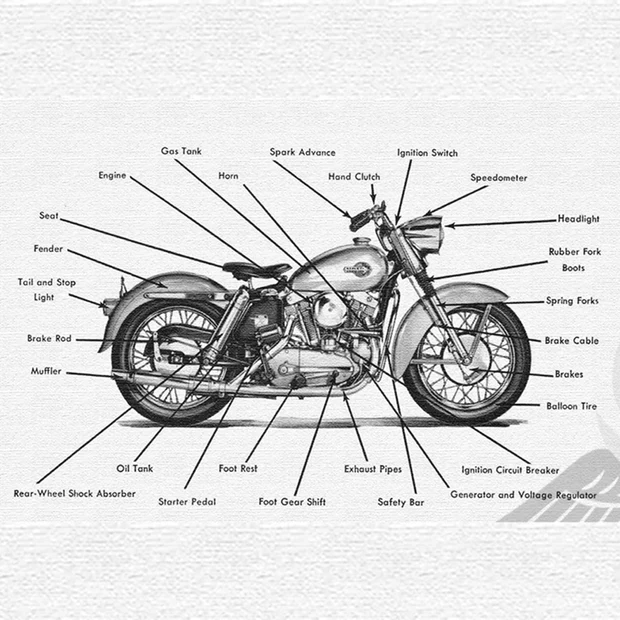Customization Tips Using Aftermarket-Compatible Motorbike Components NZ
Wiki Article
Discover the Necessary Motorcycle Parts You Required for Optimal Performance
Comprehending the vital parts of a bike is fundamental for attaining peak efficiency. Each element, from the engine to the stopping system, plays a crucial role in overall capability and security. Normal maintenance can protect against unanticipated failings and enhance the riding experience. Nonetheless, many cyclists ignore the intricacies of these systems. Finding just how they function together can cause a much more reliable adventure. What essential components should every motorcyclist focus on?The Engine: The Heart of Your Motorbike
The engine works as the core component of a motorcycle, driving its performance and defining its capacities. It is liable for transforming fuel right into mechanical energy, which powers the bike ahead. Different kinds of engines are utilized, consisting of single-cylinder, V-twin, and inline setups, each offering unique features matched for different riding designs and objectives. The engine size, generally measured in cubic centimeters (cc), considerably influences performance, with larger engines normally providing even more power and torque.Furthermore, the engine's layout and innovation, such as gas injection systems or air-cooling versus liquid-cooling, impact effectiveness and reliability. Maintenance is important for peak operation; elements like routine oil changes and checking trigger connects warranty long life. Bikers typically think about an engine's responsiveness and smoothness, as these attributes improve the general riding experience. Ultimately, the engine stays a vital element that specifies not just the bike's performance yet likewise the cyclist's connection to the maker.The Transmission: Moving Gears Efficiently
The transmission plays a vital duty in a motorcycle's efficiency, particularly in the auto mechanics of gear shifting. Understanding just how to change gears smoothly can boost the overall riding experience, while normal maintenance guarantees peak functionality. Appropriate focus to these elements can greatly influence the longevity and effectiveness of the bike.
Gear Shifting Mechanics
Smooth equipment shifting is important for optimal motorbike performance, significantly affecting both acceleration and control. The mechanics of gear moving entail the communication in between the clutch, gear bar, and transmission system. When a cyclist engages the clutch, it disengages the engine from the transmission, allowing for a gear change without harming the elements. A well-timed launch of the clutch, incorporated with exact movement of the equipment bar, assists in a seamless change between gears. This procedure assures that the engine operates within its best power band, boosting efficiency. Oem Parts New Zealand. Additionally, comprehending the gear proportions and their impact on speed and torque can aid bikers make notified selections throughout changes, inevitably contributing to an extra receptive and enjoyable riding experienceUpkeep Tips Importance
Routine upkeep plays a vital duty in ensuring that the transmission system runs efficiently, permitting smooth equipment changes. On a regular basis checking and changing the transmission liquid is essential, as old liquid can cause raised friction and wear. Additionally, examining the clutch for wear guarantees peak involvement and disengagement, protecting against slippage during equipment changes. Lubrication of relocating components is equally important to minimize friction and improve performance. Motorcycle proprietors ought to also keep an eye on for leakages and unusual noises, as these can indicate underlying problems. By adhering to these maintenance ideas, cyclists can extend the lifespan of their transmission system, ensuring that equipment shifts stay smooth and contributing to the total efficiency of their motorbike.The Braking System: Ensuring Safety on Every Ride
Braking systems are basic parts that straight affect a motorcycle's safety and efficiency. They include numerous parts, including brake pads, rotors, calipers, and hydraulic lines, all collaborating to ensure efficient slowdown. The type of braking system-- commonly either disc or drum-- influences responsiveness and stopping power.Regular maintenance is vital to copyright peak efficiency; used brake pads can bring about reduced effectiveness and enhanced stopping ranges. Additionally, the quality of brake fluid must be checked, as it can absorb dampness gradually, endangering stopping efficiency.Riders ought to additionally consider the importance of anti-lock braking systems (ABDOMINAL MUSCLE), which prevent wheel lockup during abrupt quits, improving overall safety and security. Effectively functioning brakes are not simply about quiting; they infuse self-confidence in the rider, permitting safer navigation via different terrains. Ultimately, a trusted stopping system is critical for taking pleasure in every ride with comfort.The Suspension: Enhancing Convenience and Control
A well-functioning suspension system significantly contributes to a motorbike's total efficiency, enhancing the efficiency of the braking system. The suspension plays a substantial function in soaking up shocks from unequal surfaces, guaranteeing a smoother trip while preserving tire call with the road. This call is crucial for both security and control, enabling motorcyclists to navigate edges with self-confidence and precision.Different types of shock absorber, such as telescopic forks or mono-shocks, supply varying levels of comfort and handling. Appropriately tuned suspension boosts responsiveness, giving the rider with an extra connected feel to the motorcycle. Routine upkeep checks are essential to ascertain the suspension components, including springs and dampers, are operating at their ideal. An efficient suspension system not only boosts the riding experience but likewise adds to the durability of various other motorcycle parts by minimizing wear and tear. Therefore, purchasing quality suspension is essential for any kind of major motorbike enthusiast.
The Tires: Linking You to the Roadway
Tires play a necessary duty in a motorbike's more info performance, acting as the key link in between the roadway and the cyclist. Comprehending the various types of tires available can considerably impact dealing with and safety and security. Additionally, routine upkeep is crucial to ensure peak tire efficiency and long life.Tire Keys In Explained
Exactly how do different tire kinds influence a motorcycle's efficiency? Tire kinds play a crucial duty in figuring out a motorbike's handling, security, and grasp. Sport tires, created for high performance, offer improved grip and responsiveness on paved roadways, making them optimal for competing and hostile riding. Conversely, touring tires focus on sturdiness and comfort, supplying a smoother ride for long-distance travel. Off-road tires, identified by their rugged step patterns, excel in grip on unpaved surfaces, appropriate for experience fanatics. Furthermore, dual-sport tires mix qualities from both on-road and off-road groups, satisfying flexible riding requirements. Eventually, picking the appropriate tire kind is essential for optimizing efficiency, making sure safety and security, and enhancing the total riding experience.Upkeep Tips Offered
While riding on the road, maintaining optimal tire condition is important for safety and efficiency. Consistently checking tire pressure is very important, as under-inflated tires can bring about bad handling and increased wear. It is a good idea to evaluate step depth often; worn tires compromise grip and security. Furthermore, motorcyclists should search for indicators of damage, such as bulges or splits, which can suggest the demand for replacement. Rotating tires regularly guarantees also wear, enhancing durability. Keeping tires tidy from debris and preventing extreme curbs can lengthen their life-span. Keeping correct positioning and equilibrium adds to peak efficiency, lessening stress on various other bike parts. Abiding by these maintenance suggestions will significantly improve the general riding experience.The Gas System: Fueling Performance and Efficiency
The gas system plays a vital duty in making best use of a motorcycle's performance and effectiveness, as it ensures the optimal distribution of fuel to the engine. It comprises numerous essential parts, consisting of the fuel container, fuel pump, fuel filter, and fuel injectors or carburetor. Each component should function efficiently to guarantee a effective and smooth ride.The gas tank shops gas and provides it to the engine through the gas pump, which creates the needed stress. A gas filter protects against impurities from getting in the engine, while the injectors or carburetor mix gas with air for combustion.Proper upkeep of the gas system is essential; a stopped up filter or malfunctioning injector can result in decreased efficiency and boosted gas consumption. By validating that the fuel system operates successfully, cyclists can appreciate better throttle action, much better fuel economic climate, and overall boosted riding experience.The Electrical System: Powering Your Experience
A reliable electric system is necessary for the total performance and safety of a motorbike, as it powers important components such as the ignition, lights, and various digital systems. This system includes the battery, which stores power, and the generator, in charge of generating power while the engine runs. The electrical wiring harness connects these components, guaranteeing reputable power distribution.Additionally, fuses secure the system from overloads, while relays aid control high-current devices with low-power signals. A well-maintained electric system enhances efficiency by guaranteeing smooth begins and consistent procedure of lights and signals, important for cyclist presence and safety.Regular checks of the battery's cost and links are necessary for stopping electric failures. Bikers need to also evaluate circuitry for deterioration, ensuring all elements work preferably. Eventually, a robust electrical system contributes considerably to the overall performance and integrity of the motorcycle.Regularly Asked Concerns
Exactly how Usually Should I Change My Motorbike's Battery?
The regularity of motorcycle battery substitute depends upon use and maintenance (Motorbike Components NZ). Typically, batteries must be changed every three to 5 years. Normal checks can aid determine when a replacement is necessary for peak performanceWhat Devices Do I Need for Basic Motorcycle Maintenance?
For basic bike upkeep, one requires crucial devices such as a socket collection, wrenches, screwdrivers, pliers, tire stress scale, and a torque wrench. These devices assist in reliable maintenance and assure the motorbike runs efficiently and securely.Exactly How Can I Improve My Bike's Aerodynamics?
To enhance motorbike the rules of aerodynamics, one should consider adjusting fairings, making use of windscreen expansions, maximizing body placement, and reducing total weight. These adjustments aid lessen drag, improving stability and gas efficiency during trips.What Are the Signs of a Failing Electric System?
Signs of a falling short electrical system consist of lowering lights, difficulty beginning, uneven tool readings, and blown integrates. Motorbike Components NZ. Unusual scents or deterioration around battery terminals might likewise suggest underlying issues needing instant focus for security and performance
How Do I Select the Right Oil for My Bike?
When picking oil for a motorcycle, one need to think about the supplier's specifications, thickness rankings, and the type of riding. Additionally, artificial versus conventional oil can influence performance and engine defense, influencing the choice considerably. The engine size, normally determined in cubic centimeters (cc), considerably influences efficiency, with larger engines typically providing even more power and torque.Furthermore, the engine's layout and technology, such as gas shot systems or air-cooling versus liquid-cooling, impact performance and reliability. A well-functioning suspension system greatly adds to a motorbike's general performance, matching the efficiency of the stopping system. The fuel system plays an important function in optimizing a motorbike's performance and performance, as it guarantees the optimum distribution of fuel to the engine. A gas filter protects against contaminants from entering the engine, while the injectors or carburetor mix fuel with air for combustion.Proper upkeep of the fuel system is vital; a clogged filter or malfunctioning injector can lead to decreased performance and increased gas intake. A well-maintained electric system improves efficiency by making certain smooth starts and consistent operation of lights and signals, crucial for cyclist visibility and safety.Regular checks of the battery's fee and connections are crucial for protecting against electrical failings.Report this wiki page